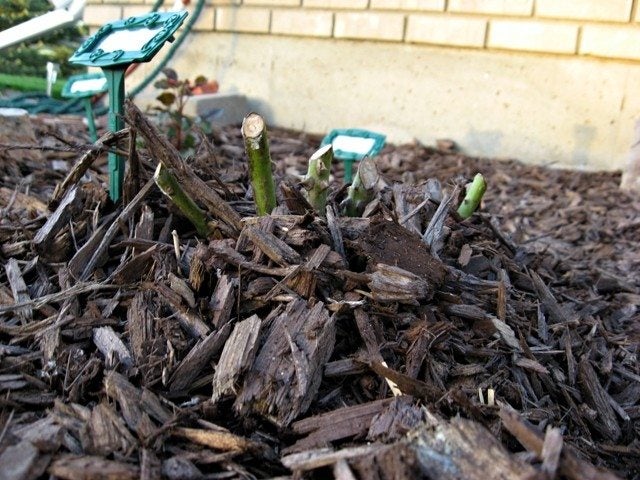Mounding Roses For Winter Protection


Sign up for the Gardening Know How newsletter today and receive a free copy of our e-book "How to Grow Delicious Tomatoes".
You are now subscribed
Your newsletter sign-up was successful
Mounding of rose bushes for winter is something all rose-loving gardeners in cold climates need to be familiar with. It will help protect your lovely roses from the winter cold and will result in a bigger and healthier rose the next growing season.
What is Mounding Roses?
Mounding roses is the building up of soil or mulch around the base of a rose bush and up onto the canes to a height of 6 to 8 inches (15-20.5 cm.). These mounds of soil or mulch help to keep the rose bush cold once they have gone through some freezing cold days and nights that have caused them to go dormant. I like to think of it as a time when the rose bushes are taking their long winter nap to rest up for a glorious spring. I use two different types of mounding in my rose beds.
Mounding by Mulching Roses for Winter
In the rose beds where I use my pebble/gravel mulch, I simply use a small, hard-toothed rake to push the gravel mulch up and around each rose bush to form the protective mounds. These pebble mounds stay in place well all winter long. When spring comes, I rake the mulch back out away from the rose bushes to make a nice even mulch layer throughout the beds once again.
Mounding Rose with Soil for Winter
The rose beds where the roses have shredded cedar mulch around them take a bit more work to mound them. In those areas, the shredded mulch is pulled back away from the rose bushes enough to expose at least a 12-inch (30.5 cm.) diameter circle around the base of the rose bush. Using either a bagged garden soil, without any fertilizer added to it, or some soil directly from the same garden, I form mounds around each rose bush. The soil mounds are the full 12-inch (30.5 cm.) diameter at the base and taper down as the mound goes up onto the canes of the rose bush. I do not want to use any soil that has fertilizer added, as this will stimulate growth, which is something I definitely do not want to do at this time. Early growth when freezing temps are still a strong possibility can kill the rose bushes. Once the mounds are formed, I water the mounds lightly to settle them in place. The mounds are then covered with some of the mulch that was pulled back from the rose bushes to start the process. Again, lightly water the mounds to help settle the mulch in place. The mulch helps to hold the soil mounds in place by helping to prevent erosion of the mounds by the wet winter snows or the harsh winter winds. In the spring, the mulch and soil can be pulled back separately, and the soil used for new plantings or spread back out in the garden. The mulch can be reused as the bottom layer of a fresh mulch application.
Mound Roses with Rose Collars
Another method that is used for mounding winter protection is by use of rose collars. This is typically a white plastic circle that is about 8 inches (20.5 cm.) tall. They can be snapped or fitted together to form a plastic circle around the base of the rose bushes. Once in place, the rose collars can be filled with soil or mulch, or a mix of the two to form the mounding protection around the rose bushes. The rose collars prevent the erosion of the mounds of protection very well. Once they are filled with the mounding materials of choice, water them lightly to settle in the materials used. Adding some more soil and/or mulch may be required to get the full amount of protection due to the settling. In the spring, the collars are removed along with the mounding materials.
Sign up for the Gardening Know How newsletter today and receive a free copy of our e-book "How to Grow Delicious Tomatoes".

Stan V. Griep contributed to Gardening Know How for many years and has been a Colorado Native Rosarian for over four decades. He is an American Rose Society Certified Consulting Master Rosarian in the Rocky Mountain District, and a member of the Denver Rose Society, the Loveland Rose Society, and the American Rose Society. He is Gardening Know How's in-house expert on all things roses.